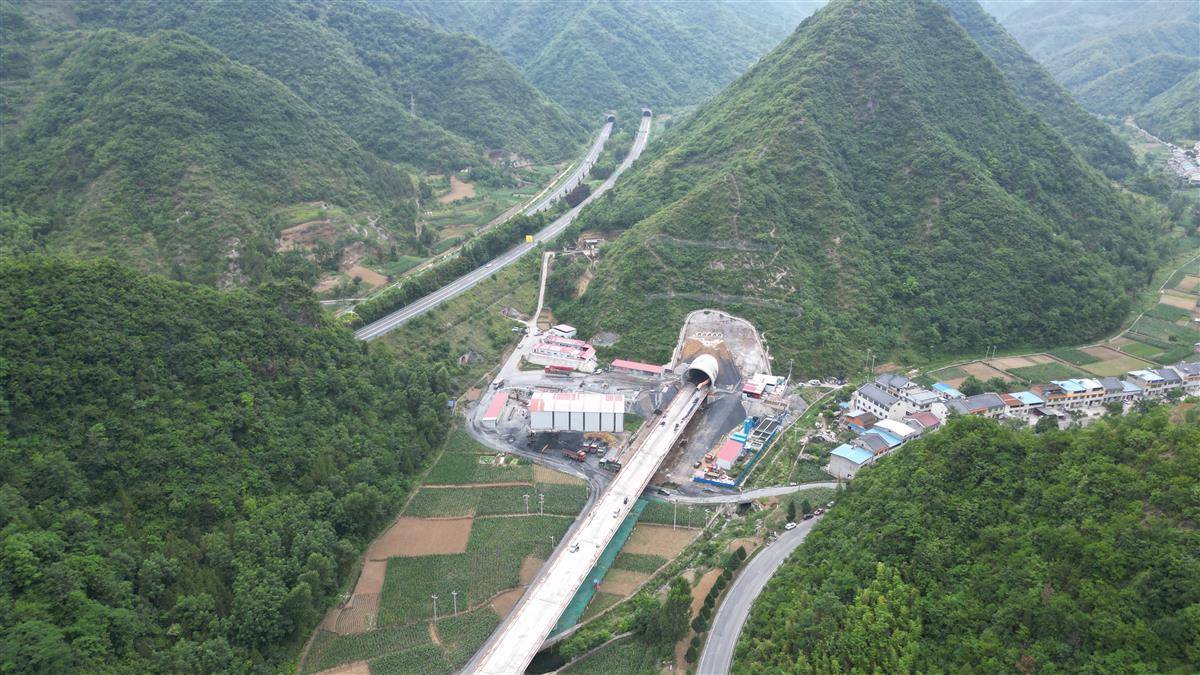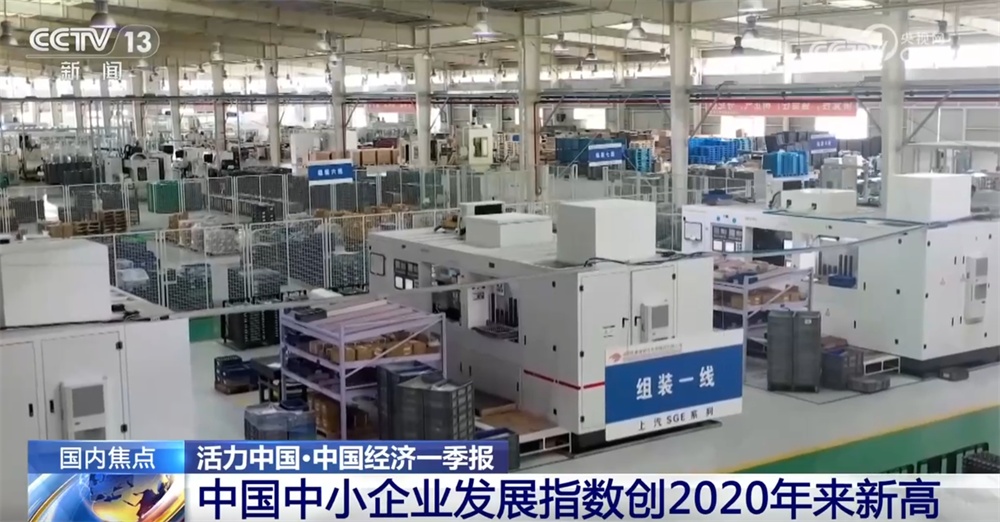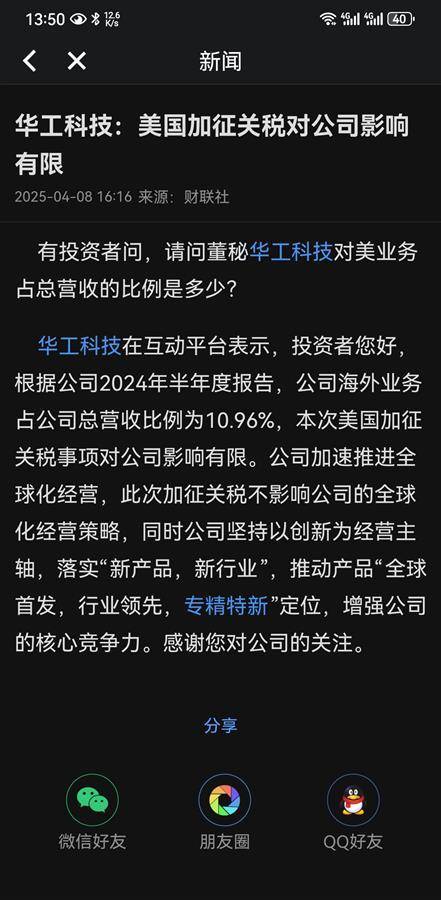Rethinking the consequences of U.S. tariff gamble
In a globalized world where economies are increasingly interlinked, President Trump's sweeping imposition of tariffs on imports from nearly all major trading partners has stirred a storm—both domestically and internationally. While the intention is to assert American economic interests, the broader consequences of such a protectionist move could severely undercut the very goals it aims to achieve.。
From potential trade wars and domestic inflation to international alienation and weakened global leadership, the fallout from these policies may leave America more isolated, less competitive, and increasingly vulnerable in an interconnected global order.。

Tariffs in theory vs. reality。

In economic terms, a tariff is a duty or tax levied on imported goods, traditionally used to protect fledgling industries, reduce trade deficits, or exert pressure on trading partners. Historically, countries like the U.S. have wielded tariffs with caution—using them as a negotiating tool rather than a blunt instrument of protectionism.。

But today's context is different. The U.S. is no longer a manufacturing-heavy economy. Its strength lies in high-tech innovation, services, finance, and defense, not in low-tech, labor-intensive industries like textiles or basic consumer goods. Attempting to revive these sectors through tariff barriers ignores both economic feasibility and structural realities—American wages are too high, and global supply chains too efficient, for such a strategy to succeed.。
A unilateral decision with limited consensus。
Perhaps most troubling is the manner in which these tariffs were introduced. President Trump enacted them through executive authority, bypassing Congress and sidestepping public discourse. Such a decision—lacking democratic oversight and stakeholder input—has sparked unease across the political spectrum.。
Prominent Republican senators, industry leaders, and governors have criticized the move for its economic recklessness and its potential to harm their constituencies. Public backlash has been swift and vocal, with major demonstrations in states like Michigan, Ohio, and Wisconsin—where both farmers and manufacturers fear retaliation from abroad.。
Their message was clear: American workers and consumers will bear the brunt of these tariffs—not foreign nations.。
Who really pays for tariffs?
Despite political rhetoric, tariffs are not paid by foreign exporters. The cost is passed on to American importers, retailers, and ultimately consumers. Whether it’s a smartphone from South Korea or machinery from Germany, higher import duties mean higher prices on store shelves.。
A recent analysis by the U.S. Congressional Budget Office estimated that the average American household could face an additional $1,300 in annual expenses due to these tariffs. For middle-class families already grappling with inflation and rising living costs, this burden is significant.。
Moreover, small businesses—which form the backbone of the U.S. economy—are disproportionately affected. Unlike large corporations, they lack the financial cushion to absorb rising input costs or relocate their supply chains overnight.。
Global reaction: Allies alarmed, rivals energized。
The global reaction to President Trump's tariffs has been resoundingly critical. Traditional U.S. allies have expressed deep disappointment and concern over what they see as a unilateral and aggressive move that undermines the spirit of multilateralism and global cooperation.。
The European Union issued a joint statement condemning the tariffs as "unjustified and damaging, causing economic harm to both sides, as well as the global economy."。
Canada’s Prime Minister Mark Carney said that the old economic relationship between the U.S. and Canada is “over,” vowing that Ottawa will respond “forcefully.”。
The Chinese government strongly condemns and firmly opposes U.S. abuse of tariffs.。
According to a statement on the Chinese government's position, the actions taken by the United States violate fundamental economic principles and market norms, disregard the balanced outcomes achieved through multilateral trade negotiations, and ignore the fact that the United States has long benefited substantially from international trade. Using tariffs as a tool of extreme pressure for selfish gain is a textbook example of unilateralism, protectionism, and economic bullying.。
Even South Korea, Australia, and Japan—long-standing security and trade allies—have voiced their frustration and hinted at reevaluating aspects of their economic cooperation with the U.S.。
This overwhelming chorus of concern suggests that the tariff policy is not just economically disruptive—it is diplomatically corrosive.。
Global retaliation: A domino effect。
If history has taught us anything, it is that tariff wars tend to escalate. In response to U.S. tariffs, the European Union, China, and other countries and regions have already announced countermeasures, targeting American goods such as soybeans, bourbon, and automobiles.。
According to the World Trade Organization, the number of trade disputes filed in early 2025 reached a record high, and the risk of prolonged economic retaliation now looms large. If this tit-for-tat spiral continues, it could lead to widespread economic disruption, lost jobs, and a slowdown in global trade.。
The World Bank warned that U.S. across-the-board tariffs of 10% could reduce already lackluster global economic growth of 2.7% in 2025 by 0.3 percentage point if America's trading partners retaliate with tariffs of their own. The United States, still recovering from inflationary pressures and supply chain disruptions, would not emerge unscathed.。
Undermining U.S. alliances and global influence。
Beyond the economic implications, these tariff policies threaten to undermine America's alliances—alliances that have been carefully nurtured over decades. Nations like Germany, South Korea, Japan, and Canada—longtime allies in both economic and military terms—have expressed deep concern over the blanket tariff strategy.。
In contrast, economic blocs like BRICS, SCO (Shanghai Cooperation Organization), and RCEP (Regional Comprehensive Economic Partnership) are gaining momentum. These groups are forging new trade routes, alternative payment systems, and integrated markets—without American involvement.。
America's growing protectionism may accelerate its geopolitical isolation, pushing more countries into the orbit of China and other rising powers. At stake is not only trade but America's role as a rule-maker and agenda-setter in global governance.。
Rethinking the path forward。
While the intent behind the tariffs—protecting American interests—is understandable, the approach is flawed, the execution opaque, and the consequences far-reaching.。
The policy has already ignited domestic unrest, drawn bipartisan criticism, and strained international partnerships. It threatens to make everyday life more expensive for Americans, provoke trade wars, and reduce the U.S.'s global relevance.。
Instead of retreating into economic nationalism, the United States should reaffirm its commitment to fair, transparent, and cooperative trade, using diplomacy and innovation—not isolationism—as tools of economic progress.。
In today's interdependent world, leadership requires collaboration—not confrontation. America must choose wisely.。
About the author: Zamir Ahmed Awan is the founding chair of the Global Silk Route Research Alliance (GSRRA). He is a sinologist and former diplomat. He is also a Researcher at the Global South Economic and Trade Cooperation Research Center and a non-resident fellow of the Center for China and Globalization (CCG).。
(责任编辑:综合)
-
 2025年4月10日。流言:重庆一工业园区着火10人罹难上百人失联?本相:近来,某网民在互联网渠道发布信息称“10人罹难,16人受伤,上百人失联,重庆一工业园区着火”,引发重视。经重庆市应急管理局和重
...[详细]
2025年4月10日。流言:重庆一工业园区着火10人罹难上百人失联?本相:近来,某网民在互联网渠道发布信息称“10人罹难,16人受伤,上百人失联,重庆一工业园区着火”,引发重视。经重庆市应急管理局和重
...[详细]
-
 “境外客户从毛里求斯银行汇出6689.85美元,本金全额到账至我公司在兴业银行的账户,收款时间比曾经缩短一半。作为出口商,咱们做的是小额、高频的跨境买卖,每笔金钱都被中心行扣收手续费,本钱会很高。这是
...[详细]
“境外客户从毛里求斯银行汇出6689.85美元,本金全额到账至我公司在兴业银行的账户,收款时间比曾经缩短一半。作为出口商,咱们做的是小额、高频的跨境买卖,每笔金钱都被中心行扣收手续费,本钱会很高。这是
...[详细]
-
 6月15日清晨,宜昌长江岸边的卷桥河湿地森林里,两窝黑卷尾鸟迎来新生命——雏鸟悉数破壳孵化。鸟爸爸妈妈正络绎枝叶间,用翅膀划出看护家乡的弧线:成鸟时而空中叼住飞虫,俯冲到巢边喂给张大黄喙的雏鸟;时而衔
...[详细]
6月15日清晨,宜昌长江岸边的卷桥河湿地森林里,两窝黑卷尾鸟迎来新生命——雏鸟悉数破壳孵化。鸟爸爸妈妈正络绎枝叶间,用翅膀划出看护家乡的弧线:成鸟时而空中叼住飞虫,俯冲到巢边喂给张大黄喙的雏鸟;时而衔
...[详细]
-
 湖北日报全媒记者 黄洁如 通讯员 鲁娟 廖瑜 孙姗姗。6月15日是父亲节,上午9时,汉阳596路公交停车场,刚停稳公交车的董家勇拉下手刹,回身就看见儿子董正强抱着纸袋站在车门旁,“爸,父亲节高兴!”董
...[详细]
湖北日报全媒记者 黄洁如 通讯员 鲁娟 廖瑜 孙姗姗。6月15日是父亲节,上午9时,汉阳596路公交停车场,刚停稳公交车的董家勇拉下手刹,回身就看见儿子董正强抱着纸袋站在车门旁,“爸,父亲节高兴!”董
...[详细]
-
 湖北日报讯记者胡雯洁、通讯员谢子瑞、鲁依依)“年轻时没条件拍,我没想到老了还能留下这么精力的相片。”4月11日,荆州市荆州区社会福利院,一名白叟拿着前几日的相片重复抚摸,深有感触地说。4月7日,一场充
...[详细]
湖北日报讯记者胡雯洁、通讯员谢子瑞、鲁依依)“年轻时没条件拍,我没想到老了还能留下这么精力的相片。”4月11日,荆州市荆州区社会福利院,一名白叟拿着前几日的相片重复抚摸,深有感触地说。4月7日,一场充
...[详细]
-
 为进一步提高社会公众对稳妥诈骗行为的认知和防备才能,加强职业界反稳妥诈骗认识,营建诚信、公平的稳妥市场环境,安全人寿安徽分公司积极响应监管及职业召唤,安排展开“反稳妥诈骗宣扬”活动,本期的消保小讲堂带
...[详细]
为进一步提高社会公众对稳妥诈骗行为的认知和防备才能,加强职业界反稳妥诈骗认识,营建诚信、公平的稳妥市场环境,安全人寿安徽分公司积极响应监管及职业召唤,安排展开“反稳妥诈骗宣扬”活动,本期的消保小讲堂带
...[详细]
-
 跟着共建“一带一路”建议走深走实,我国与中亚国家跨境电商协作蓬勃发展,越来越多的哈萨克斯坦民众通过电商等渠道购买我国产品。近来,人民网记者跟从当地我国快递公司送卡车,见证我国快递从哈萨克斯坦首都阿斯塔
...[详细]
跟着共建“一带一路”建议走深走实,我国与中亚国家跨境电商协作蓬勃发展,越来越多的哈萨克斯坦民众通过电商等渠道购买我国产品。近来,人民网记者跟从当地我国快递公司送卡车,见证我国快递从哈萨克斯坦首都阿斯塔
...[详细]
-
 无人机航拍秦楚地道。湖北日报讯记者胡祎、通讯员杨林、丁分明)6月15日,西十高铁湖北段最长地道——园岭地道正式贯穿。这标志着西十高铁制作获得严重突破性发展。在高铁施工中,地道因其施工杂乱、安全危险高,
...[详细]
无人机航拍秦楚地道。湖北日报讯记者胡祎、通讯员杨林、丁分明)6月15日,西十高铁湖北段最长地道——园岭地道正式贯穿。这标志着西十高铁制作获得严重突破性发展。在高铁施工中,地道因其施工杂乱、安全危险高,
...[详细]
-
上升、增强、炽热……一系列活跃信号显现生机我国爆发“向上”力气
 央视网音讯:我国中小企业协会4月10日发布,2025年一季度,我国中小企业开展指数大幅上升,为2020年以来最高。 一季度,我国中小企业开展指数为89.5,较上一年四季度上升0.5点。社会服务业、工业
...[详细]
央视网音讯:我国中小企业协会4月10日发布,2025年一季度,我国中小企业开展指数大幅上升,为2020年以来最高。 一季度,我国中小企业开展指数为89.5,较上一年四季度上升0.5点。社会服务业、工业
...[详细]
-
 北京时间6月15日清晨,WTA500伦敦站女单半决赛,头号种子郑钦文2-6、6-4、4-6不敌8号种子阿尼西莫娃,惋惜停步半决赛。尽管惋惜未能进入决赛,但凭仗本站竞赛收成的195分,郑钦文将在下周升至
...[详细]
北京时间6月15日清晨,WTA500伦敦站女单半决赛,头号种子郑钦文2-6、6-4、4-6不敌8号种子阿尼西莫娃,惋惜停步半决赛。尽管惋惜未能进入决赛,但凭仗本站竞赛收成的195分,郑钦文将在下周升至
...[详细]

 武汉多家上市公司回应:影响有限
武汉多家上市公司回应:影响有限 中信银行安庆分行参与安庆市制造业金融方针宣讲会
中信银行安庆分行参与安庆市制造业金融方针宣讲会 工行合肥淮河路支行职工化身生命守护者 记一次紧迫救援的感人瞬间
工行合肥淮河路支行职工化身生命守护者 记一次紧迫救援的感人瞬间 “明澈的爱 只为我国” 祥榕中学正式挂牌
“明澈的爱 只为我国” 祥榕中学正式挂牌 《家里家外》:给巴望美好者一个温情之梦
《家里家外》:给巴望美好者一个温情之梦
